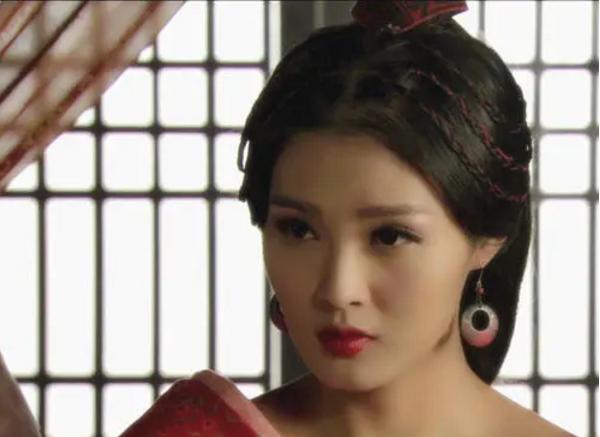Han family Qin Diyue, flow shadow illumination concubine. As soon as you go up to the Jade Pass Road, the end of the world will not return. - Li Bai
One day, when Li Bai heard the story of Zhaojun's outflower again, he suddenly had a brilliant flash of inspiration and immediately wrote this famous poem for thousands of years to lament the fate of Wang Zhaojun. When wang zhaojun is mentioned, many people first think of the title of "four beauties" and think of her falling goose posture. But what many people don't know is that behind Wang Zhaojun's beautiful aura, it is a tragic life.

Wang Zhaojun was born in 54 BC and grew up in an ordinary family in Nan County, Hubei Province. Her father, Wang Xiang, had already stained his sideburns when he got this daughter, and the old woman made Wang Xiang very happy. Therefore, since Wang Zhaojun was born, Wang Xiang has regarded it as a pearl in the palm of his hand, and his brother and sister-in-law have also held it in the palm of their hands, doing their best to be good to Wang Zhaojun, so that Wang Zhaojun, who was born ordinary, was able to learn piano, chess, calligraphy and painting early, and became a famous young lady in Nan County.
Gradually, Wang Zhaojun's posture and talent were well known throughout Nan County. At that time, when the Han Yuan Emperor selected xiunu in the whole country, the Southern County naturally elected Wang Zhaojun. So in 38 BC, Wang Zhaojun was elected into the Court of the Great Han Dynasty as an ordinary citizen and became a palace maid.
Because there were many women in the harem, the Han Yuan Emperor was too lazy to meet them one by one, so he sent the painters in the palace to let him paint the appearance of the women in the palace, and then he made a unified selection. Other famous show girls immediately used gold and silver to please the painter and let the painter paint himself beautifully, but Wang Zhaojun was unwilling to pay bribes, which angered the painter, and as a result, the painter deliberately painted Wang Zhaojun's portrait much uglier. In this way, Wang Zhaojun rubbed shoulders with Emperor Yuan of Han.
In 33 BC, the Xiongnu at that time had long been feared by the Han Dynasty, and the Xiongnu had become a vassal state of the Han Dynasty. In this year, the Xiongnu leader Hu Han Shan Yu came to Chang'an to see the Son of Heaven, and hoped to be able to marry the Great Han to marry a hundred generations. Emperor Yuan of Han thought about it, and his harem was absolutely beautiful, and he was reluctant to give Han evil casually.
At this time, Emperor Yuan of Han suddenly thought of the palace lady Wang Zhaojun who had seen before, and immediately decided to give Wang Zhaojun to Hu Han Evil Shan Yu. And when Wang Zhaojun was sent to huhan evil Shan Yu's carriage, Hu Han evil Shan Yu was also stunned by Wang Zhaojun's beauty, and immediately said that he would do his best to be loyal to the Han Dynasty and defend the border for the Han Emperor.
Emperor Han Yuan was a little confused for a while, and couldn't understand why Hu Han evil had obtained a palace girl with a general posture, and instead of feeling resentful in his heart, he also prayed to him again and again, but these were all trivialities, and Emperor Han Yuan sent Hu Han Evil Shan Yu and Wang Zhaojun out of Chang'an together.
Wang Zhaojun thus became the wife of Hu Han and went to the northern xiongnu to take root and live. The two lived together for nearly 3 years, during which Wang Zhaojun gave birth to a son for Hu Han, but there was not much affection between the two.
In 31 BC, after The Young Age of Hu Han died young, the homesick Wang Zhaojun immediately asked the Han court to return to China. As a result, the Han Ting side only coldly replied with 3 words - "from Hu Customs". The so-called "Hu custom" is the marriage custom among the Xiongnu - the father dies and the son inherits, and this "succession" word contains not only the inheritance of the father, but also the father's wife and concubine.
In this way, Wang Zhaojun married the eldest son of Hu Han Evil Shan Yu and became the wife of her husband's son. This is undoubtedly a great humiliation and blow to Wang Zhaojun, who is a Han Chinese who attaches great importance to ethical principles. But at this point, What other options did Wang Zhaojun, who was in a foreign country and had no relatives, have?
In this way, Wang Zhaojun and Fu Zhu Li Dan Yu walked into the cave room and gave birth to 2 daughters for Fu Zhu Li Shan Yu successively. When Wang Zhaojun thought that he had lived this life like this, after 11 years of wang Zhaojun's marriage to Fu Zhu Li Dan Yu, Fu Zhu Li Dan Yu also passed away.
In 20 BC, Fu Zhu died of illness, and his brother Sohu RuoYan Shan Yu succeeded to his throne, and at the same time, Wang Zhaojun also became the wife of Xin Shan Yu. Yi Fu again, but also his own little uncle, which made Wang Zhaojun feel more and more sad and depressed, and finally accumulated depression and died in 19 BC.
Nowadays, most people's impressions of Wang Zhaojun stay in the posture of falling geese, but they do not know that behind this beauty, there is such a tragic story. Throughout her life, she was used as a tool to maintain the stability of the northern region of the Han Dynasty, and in the end she could only die elsewhere, unable to return to her roots.